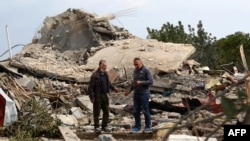Lebanon is bracing for more deadly conflict, analysts say, as Israel launches its deepest airstrikes inside the country in years.
Israel’s airstrike Monday on Baalbek, in the Beka’a Valley deep inside Lebanon, is the most significant, they say, since the one that killed top Hamas official Saleh Al-Arouri in the capital, Beirut, in early January.
The Iran-backed Lebanese militant group Hezbollah said it shot down an Israeli drone over Baalbek, a Hezbollah stronghold where it has an air defense unit. It then fired a missile that was intercepted by Israel, landing near a synagogue close to Nazareth in northern Israel without causing injury or damage.
Later, an Israeli fighter jet carried out the targeted killing of Hassan Salami, a senior Hezbollah officer in southern Lebanon, alleging he was responsible for carrying out rocket attacks on northern Israel.
Analyst Dania Koleilat Khatib told VOA that “neither side wants to show that they are backing down, because they will lose their credibility.”
Khatib, who is president of the Research Center for Cooperation and Peace Building in Beirut, said, “You have this increasing tit-for-tat. If Hezbollah doesn’t show their ‘resistance,’ they’re politically finished. If they put up a fight, they might incur losses like in 2006 [with Israel], but they will renew their legitimacy past a few years. They rebuilt their capability, and now, supposedly, they have 150,000 precision-guided missiles.”
Lebanese analyst Patricia Karam, a nonresident fellow at the Washington-based Arab Center, said that war is “looming between Lebanon and Israel.”
“Lebanon is, on the one hand, at the mercy of Hezbollah, whose ... raison d’etre is derived from its resistance against Israel’s occupation of part of Lebanon,” she said. “On the other, it also risks becoming a casualty of those in Israel who believe that really defeating Hezbollah will restore their sense of security.”
She said Israel has been "intensifying this rhetoric against Hezbollah and demanding its retreat from the border.”
David Hale, a Global Fellow with the Wilson Center in Washington and former U.S. ambassador to Lebanon, recently told a webinar at the center that Lebanon’s army is not able to deploy at the border with Israel, and that while Hezbollah appears to “have lots of autonomy, the answer to the border issue is in Tehran, not Beirut.”
Analyst Khatib concurs with that view. “Everything that has to do with Lebanon’s foreign policy, Iran makes the call, whether with Syria or Israel,” she said.




